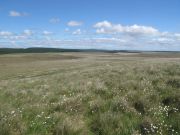Horticulture veterans call for more open debate on peat
The Government has asked for views to be submitted by 18th March 2022 on measures to end the retail sale of peat and peat containing products in horticulture in England and Wales.
In response, some of the most experienced growers and journalists publish this open letter.
The open letter reads:
The undersigned feel there should be a much more open debate on the peat in horticulture issue with both for and against statements up for discussion.
It should be noted at the outset we all believe Sphagnum moss peat should not be used for soil improvement.
- It is universally agreed peat should not be used for soil improvement, there are plenty of alternatives for this use, including garden compost, well-rotted manures and leaf-mould.
- Sphagnum Moss Peat from Raised Bogs has been and remains the best constituent for seed, cuttings and potting composts. Peat to case spawned mushroom growing media currently has no alternative.
- Moss peat use in seed and potting composts is currently, by all available measures, an environmentally friendly growing media and in most uses, results in the absorption of CO2, plus the sequestration of carbon in woody growth and the soil.
- Cut-away raised peat bogs can be restored, where water levels are raised and harvested areas re-seeded with the correct species of sphagnum. Newly planted sphagnum grows rapidly, laying down green moss at 5 to 7 cms per year, which make peat a sustainable and renewable resource. (e.g. Beadamoss on Farming sphagnum; A B Rekyva, Lithuania)
- Restoring cut-away bogs and the rapid growth of seeded sphagnum absorbs carbon dioxide in great quantity.
- Most current peat-free composts need much higher rates of base fertilizer (up to four times more) to replace plant foods absorbed by breaking down fibres. They also need more regular watering (at least double), which in turn leads to nitrates being lost in drainage water. Peat has excellent water retention qualities and holds onto base fertilizers to feed plants.
- The growth of some plants is not as good in many of the peat-free composts currently available and this includes all the ericaceous subjects, namely azaleas, camelia, heathers and rhododendrons.
- Air dried peat can be compressed and is light in weight, so uses thinner polythene in wrappers and less fossil fuel to transport.
- Sphagnum moss peat is sterile, clean to handle, pest and pollutant free. Unlike some of the peat free alternatives, where there is a risk of introducing weedkillers and plant diseases.
- Peat free composts are made up to widely differing recipes, so it is very difficult for home gardeners to adapt their watering and feeding practices when the compost mixes are no longer standard. Where they experience poor growth and failures, we risk losing the attraction for people to stay at home gardening and growing some of their own food.
The letter is signed by:-
Sir Brian H Donohoe, Retired MP, Secretary of the Gardening and Horticultural Group 1992—2015
Peter Seabrook, International TV Gardening Presenter/Gardening Editor, The Sun.
Robert Hillier, Director Hillier Nurseries and Garden Centres.
Jim McColl, Presenter BBC TV The Beechgrove Gardening Progammes.
Adrian Bloom, Chair Blooms Nurseries Ltd.
Jason Bloom, Managing Director Blooms Nurseries.
Bunny Guinness, Garden Designer and Broadcaster.
Andrew Tokely, Horticultural Director, E. W. King & Co Ltd.
Garry Coward Williams, Editor, Amateur Gardening Magazine.
Robert Wharton, Director Wharton’s Roses (fears unfair European Competition).
Paul Wharton, Director Wharton’s Roses.
Alan Sargent, Founder Association of Professional Landscapers.
Paul Cooling, Chair Coolings Garden Centres. (Currently not enough Peat Free alternatives).
Neil and Nicci Gow, Experienced and long-term Garden Retailers.
Steve McCurdy, Managing Director, Majestic Trees Ltd.
Kenneth Cox, Director Glendoick Nursery and Garden Centre, Ericaceous Plat Exporter.
Christine Walkden, Gardening Broadcaster and Lecturer.
Steve and Val Bradley, Authors, Social Media, National gardening Columnists.
Graham Richardson, Group Managing Director Johnsons of Wixley and six fellow directors:-
John, Andrew, Iain, Robert, Eleanor and Jonathon Whitemore.
Douglas Wilson, Director/Partner, Trioscape Garden Centre and Nursery.
Jo Davey, Horticultural Marketing Research and Development Manager.
Michael Smith, Director Grange, Nurseries and MeadowCroft Garden Centre.
Simon Crawford, Director, Burpee Europe.
Tim Kerley, Director, Kerley & Co, Plant Breeders.
Derek Jarman, Director Hayloft Nurseries Ltd.
The Government consultation
The Government has asked for views to be submitted by 18th March 2022 on measures to end the retail sale of peat and peat containing products in horticulture in England and Wales.
On 18th December the Government wrote: -
We want to know what you think about our proposed measures to end the retail sale of peat in England and Wales.
We need your views on:
- measures to end the use of peat and peat containing products in retail horticulture
- views on each of the proposed measures and how they could operate
- any evidence you can provide on the impacts of ending the use of peat and peat containing products in the professional horticulture and wider sectors
Peatlands are an iconic feature of our landscapes and the UK’s largest stores of carbon. They also provide vital ecosystem services including supplying UK drinking water, decreasing flood risk, and providing food and shelter for rare wildlife.
The extraction of peat releases the carbon stored inside as carbon dioxide, contributing to climate change. Peat is extracted in the UK for, primarily, horticultural purposes. By ending the retail sale of peat in horticulture, we will be protecting our vulnerable peatlands and helping to prevent climate change.

